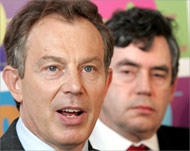EU voters punish their governments
Europe’s voters have dealt stunning ballot losses to numerous governments across the continent.

Although turnout slumped to a record low in polls for a newly enlarged European Parliament on Sunday, the French and German governments appear to have suffered the most for unpopular domestic policies.
In a stinging rebuke of his reform agenda, exit polls showed Chancellor Gerhard Schroeder’s Social Democrats being mauled as voters gave the party its worst-ever score in a nationwide vote since the second world war.
France’s opposition Socialist party emerged as clear winners over centre-right supporters of President Jacques Chirac.
Britain’s UK Independence Party was also forecast to make dramatic gains at the expense of both Labour and the Conservatives.
The list of countries where governments appeared to have lost to the opposition included Belgium, Portugal, Estonia, Slovenia, Denmark, Finland, Hungary and Poland, according to partial results and exit polls.
Among the few governing parties to buck the trend were Spain, where the ruling Socialists emerged as narrow winners, while in Greece ruling conservatives were ahead, according to partial results.
Poor turnout
One poll indicated that voter turnout may have fallen to less than 45% – the lowest since the first elections to the EU’s only directly elected assembly began in 1979.
Nevertheless, figures backed up forecasts that the EU polls would be used to punish governments on domestic issues.
 |
|
Blair (L) conceded his Iraq policy |
“It is clear that the European elections are used as a balance-sheet election,” said Martin Schulz, head of the German Social Democrats’ list competing for his country’s 99 seats, the biggest chunk in the parliament.
Eurosceptic parties opposed to the entire European project are predicted to make considerable gains in the polls for the freshly expanded 732-seat parliament.
The EU assembly, based in both Brussels and the French city of Strasbourg, was set up as a democratic balance to the bloc’s powerful but unelected Commission and has since gradually amassed considerable legislative power.
Main themes
Campaign themes in the polls varied widely from country to country, with local issues often dominating as opposed to European-level policy debate. Many see the polls as mid-term tests for national elections.
But the Iraq conflict weighed on the polls in many states; Britain’s Prime Minister Tony Blair openly conceded that his decision to join the war by the United States had cost him votes.
Another key campaign theme in some countries has been Turkey, with critics fighting plans to let the largely Muslim nation join the predominantly Christian European club.